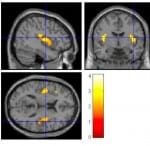 We have been invited to submit a full version of our Knowledge Transfer Partnership proposal with the West of England School and College for Young People with Little or No Sight (http://www.westengland.ac.uk/).
We have been invited to submit a full version of our Knowledge Transfer Partnership proposal with the West of England School and College for Young People with Little or No Sight (http://www.westengland.ac.uk/).
The project aims to bring knowledge of visual neuroscience into specialist visual impairment education, where a large number of children have visual problems that are of a neurological origin (rather than arising from disorders of the eye). This innovative partnership with the University of Lincoln School of Psychology and School of Computer Science will also develop a visual rehabilitation “game”: A fun computer based tool which will benefit children with visual field loss (i.e. “holes” in their vision due to damage to the brains visual pathways). The game will use principles derived from existing programmes used in adults with visual field loss, in which patients have to search for difficult to find objects on a computer screen (a so-called “visual search” task), but modified to make them more interesting and fun for children and to maximise the efficiency of learning.
I am personally excited about the prospect of this project coming to fruition and it represents a great opportunity to generat impact from knowledge derived from neuroscience and psychology in order to put it into practice in specialist education.
References and relevant links
Pambakian ALM, Mannan SK, Hodgson TL & Kennard C (2004) Saccadic visual search training: a treatment for patients with homonymous hemianopia Journal Of Neurology Neurosurgery And Psychiatry 75(10): 1443-1448.
http://hemianopia.blogspot.co.uk/2011/03/another-visual-search-saccade-training.html




